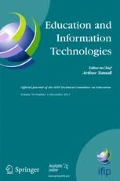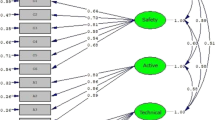Abstract
Aim of the study is reviewing parental mediation based on some variables by adapting “Parental Mediation of Young Children’s Internet Use Scale”- which was developed by Nikken and Jansz (Learning, Media and Technology, 39(2), 250–266, 2014) - into Turkish. The study was conducted in two steps. At the first step, data was collected for the scale adaptation process, and validity and reliability of the scale were calculated. 170 parents participated into the study at the first step. At the second step, scanning was done through adaptive scale. 341 parents participated at the second step. This study was conducted through purposive and convenience sampling method by selection of the parents with different socio-demographic features and having children at 5th and 6th grades in middle school. Self-description form and two different scales were utilized in the study. At the end of the study, to detect parental mediation of young children’s internet use level, a scale which is competent, valid and reliable in terms of content was contributed to the related Turkish literature. Within frame of this study, parental mediation of their young children’s internet use levels were found to differentiate based on levels of age, education and internet usage experience through the scanning done by utilizing the scale created as a result of the scale adaptation. Additionally, a positive and meaningful relation between parental mediation scores and digital data security was found in the study.


Similar content being viewed by others
References
Baker, S., Sanders, M. R., & Morawska, A. (2017). Who uses online parenting support? A cross-sectional survey exploring Australian parents’ internet use for parenting. Journal of Child and Family Studies, 26(3), 916–927.
Broekman, F. L., Piotrowski, J. T., Beentjes, H. W., & Valkenburg, P. M. (2016). A parental perspective on apps for young children. Computers in Human Behavior, 63, 142–151.
Büyüköztürk, Ş. (2009). Sosyal bilimler için veri analizi el kitabı: İstatistik, araştırma deseni, SPSS uygulamaları ve yorum. Ankara: Pegem Yayınları.
Candan, D. G., & Gencel, İ. E. (2015). Öğretme Motivasyonu Ölçeği’ni Türkçe’ye Uyarlama Çalışması. Mehmet Akif Ersoy Üniversitesi Eğitim Fakültesi Dergisi, 36, 72–89.
Clarkson, A., & Zierl, L. (2018). An online parenting program grows digital parenting skills and parent-school connection. Journal of Extension, 56(5). Retrieved from https://joe.org/joe/2018september/pdf/JOE_v56_5rb1.pdf. Accessed 03 May 2019.
Donald, F. R. & Ulla, G.F. (2003). Kids and the New Millenium, A Comprehensive Analysis of Children’s Media Use. Retrieved from http://kaiserfamilyfoundation.files.wordpress.com/2013/01/kidsmedia-the-new-millennium-report.pdf. Accessed 11 Sept 2018.
Duggan, M., Lenhart, A., Lampe, C., & Ellison, N. B. (2015). Parents and social media. Pew Research Center, 1–37.
Durak, H. & Seferoğlu, S. S. (2016). Siber Zorbalık: Eski Bir Toplumsal Sorunla İlgili Yeni Tanımlamalar, Bakışlar, Değerlendirmeler. Görgün- Baran, A. & Çakır, M. (Ed.) içinde İnter-disipliner Yaklaşımla Gençliğin Umudu Toplumun Beklentileri, ss. 167–187. Hacettepe Üniversitesi Yayınları, Ankara.
Forgays, D. K., Hyman, I., & Schreiber, J. (2014). Texting everywhere for everything: Gender and age differences in cell phone etiquette and use. Computers in Human Behavior, 31, 314–321.
Hambleton, R. K., & Patsula, L. (1999). Increasing the validity of adapted tests: Myths to be avoided and guidelines for improving test adaptation practices. Journal of Applied Testing Technology, 1(1), 1–30.
Huang, G., Li, X., Chen, W., & Straubhaar, J. D. (2018). Fall-behind parents? The influential factors on digital parenting self-efficacy in disadvantaged communities. American Behavioral Scientist, 62(9), 1186–1206.
İnan-Kaya, G., Mutlu-Bayraktar, D., & Yılmaz, Ö. (2018). Digital parenting: Perceptions on digital risks. Kalem Uluslararası Eğitim ve İnsan Bilimleri Dergisi, 8(1), 131–157.
Karasar, N. (2005). Bilimsel araştırma yöntemi (17. Baskı). Ankara: Nobel Publications.
Lenhart, A., Duggan, M., Perrin, A., Stepler, R., Rainie, H., & Parker, K. (2015). Teens, social media & technology overview 2015 (pp. 04-09). Pew research center [internet & American life project].
Livingstone, S., Blum-Ross, A., Pavlick, J., & Ólafsson, K. (2018). In the digital home, how do parents support their children and who supports them? Parenting for a digital future: Survey report 1. Retrieved from http://blogs.lse.ac.uk/parenting4digitalfuture/2018/02/06/in-the-digital-home Accessed 03 May 2019.
Lupton, D., Pedersen, S., & Thomas, G. M. (2016). Parenting and digital media: From the early web to contemporary digital society. Sociology Compass, 10(8), 730–743.
Madden, M., & Zickuhr, K. (2011). 65% of online adults use social networking sites. Pew Internet & American Life Project, 1, 14.
Marsh, A., Downs, J. S., & Cranor, L. F. (2017). Experts’ views on digital parenting strategies. Pittsburgh: Carnegie Mellon University.
Nikken, P., & Jansz, J. (2014). Developing scales to measure parental mediation of young children's internet use. Learning, Media and Technology, 39(2), 250–266.
Nikken, P., & Schols, M. (2015). How and why parents guide the media use of young children. Journal of Child and Family Studies, 24(11), 3423–3435.
Palaigeorgiou, G., Katerina, K., Bratitsis, T., & Xefteris, S. (2017). Parental mediation of tablet educational use at home and at school: Facilitators or preventers? In Interactive Mobile Communication, Technologies and Learning (pp. 924–935). Springer, Cham.
Papadakis, S., Kalogiannakis, M., & Zaranis, N. (2019). Parental involvement and attitudes towards young Greek children's mobile usage. International Journal of Child-Computer Interaction. https://doi.org/10.1016/j.ijcci.2019.100144.
Park, N., Kim, Y. C., Shon, H. Y., & Shim, H. (2013). Factors influencing smartphone use and dependency in South Korea. Computers in Human Behavior, 29(4), 1763–1770.
Paus-Hasebrink, I., Sinner, P. & Prochazka, F. (2014). Children’s online experiences in socially disadvantaged families: European evidence and policy implications. London: EU kids online, LSE. http://www.lse.ac.uk/media@lse/research/ EUKidsOnline/EUKids III/Reports/Disadvantaged_children.pdf. Accessed 26 June 2014.
Pew Research Center (2014). Mobile technology fact sheet. http://www.pewinternet.org/fact-sheets/mobile-technology-fact-sheet/adresinden 10.09.2018 tarihinde erişilmiştir.
Przybylski, A. K., & Weinstein, N. (2013). Can you connect with me now? How the presence of mobile communication technology influences face-to-face conversation quality. Journal of Social and Personal Relationships, 30(3), 237–246.
Racz, S. J., Johnson, S. L., Bradshaw, C. P., & Cheng, T. L. (2017). Parenting in the digital age: Urban black youth's perceptions about technology-based communication with parents. Journal of Family Studies, 23(2), 198–214.
Rideout, V., & Hamel, E. (2006). The media family: Electronic media in the lives of infants, toddlers, preschoolers and their parents. San Francisco: Henry J. Kaiser Family Foundation.
Salehan, M., & Negahban, A. (2013). Social networking on smartphones: When mobile phones become addictive. Computers in Human Behavior, 29(6), 2632–2639.
Samaha, M., & Hawi, N. S. (2016). Relationships among smartphone addiction, stress, academic performance, and satisfaction with life. Computers in Human Behavior, 57, 321–325.
Seferoğlu, S. S., Durak, H. Y., Karaoğlan-Yılmaz, F. G., & Yılmaz, R. (2018). Bilgi Güvenliği Farkındalığı ve Bilgi Güvenliği Politikalarıyla İlgili Bir İnceleme. B. Akkoyunlu, A. İşman & H. F. Odabaşı (Ed.) içinde Eğitim teknolojileri okumaları 2018, (3. Bölüm, ss. 29-43). Pegem Yayıncılık.
Sırakaya, M., & Seferoğlu, S. S. (2018). Çocukların çevrim-içi ortamlarda karşılaştıkları riskler ve güvenli internet kullanımı. B. Akkoyunlu, A. İşman & H. F. Odabaşı (Ed). Eğitim teknolojileri okumaları 2018, (12. Bölüm, ss. 185–202). TOJET ve Sakarya Üniversitesi, Adapazarı.
Symons, K., Ponnet, K., Walrave, M., & Heirman, W. (2017). A qualitative study into parental mediation of adolescents' internet use. Computers in Human Behavior, 73, 423–432.
Turkish Statistical Institute (2018). Türkiye’nin İnternet Kullanım Alışkanlıkları - TÜİK 2018. http://www.tuik.gov.tr/PreHaberBultenleri.do?id=27819.
Ulusoy, A., & Bostancı, M. (2014). Çocuklarda sosyal medya kullanımı ve ebeveyn rolü. The Journal of Academic Social Science Studies International Journal of Social Science, (28), 559–572. https://doi.org/10.9761/JASSS2233.
Valcke, M., Bonte, S., De Wever, B., & Rots, I. (2010). Internet parenting styles and the impact on internet use of primary school children. Computers & Education, 55(2), 454–464.
Wartella, E., Rideout, V., Lauricella, A. R., & Connell, S. (2014). Revised parenting in the age of digital technology: A national survey. Report of the Center on Media and Human Development, School of Communication, Northwestern University. Available online at: http://cmhd.northwestern.edu/wp-content/uploads/2015/06/ParentingAgeDigitalTechnology.REVISED.FINAL_.2014.pdf. Accessed 10 April 2019.
Wood, E., Petkovski, M., De Pasquale, D., Gottardo, A., Evans, M. A., & Savage, R. S. (2016). Parent scaffolding of young children when engaged with mobile technology. Frontiers in Psychology, 7, 690. https://doi.org/10.3389/fpsyg.2016.00690.
Yaman, F. (2018). Türkiye'deki ebeveynlerin dijital ebeveynlik öz yeterliklerinin incelenmesi. Yayınlanmamış Doktora Tezi. Anadolu Üniversitesi, Eskişehir.
Yıldız-Durak, H., & Seferoğlu, S. (2018). Factors associated with smartphone use and addiction among middle school students. Journal of Educational Technology Theory and Practice, 8(1), 1–23.
Yilmaz, E., Şahin, Y. L., & Akbulut, Y. (2015). Dijital Veri Güvenliği Farkındalığı Ölçeğinin Geliştirilmesi. AJIT-e: Online Academic Journal of Information Technology, 6(21), 23–40.
Yurdakul, I. K., Dönmez, O., Yaman, F., & Odabaşı, H. F. (2013). Dijital ebeveynlik ve değişen roller. Gaziantep University Journal of Social Sciences, 12(4), 883–896.
Acknowledgements
This study is derived from the master thesis “Investigation of Parental Mediation According to Some Variables" which was completed by Aykut Durak under the supervision of Assist. Prof. Dr. Hüseyin Kaygın.
Author information
Authors and Affiliations
Corresponding author
Additional information
Publisher’s note
Springer Nature remains neutral with regard to jurisdictional claims in published maps and institutional affiliations.
Rights and permissions
About this article
Cite this article
Durak, A., Kaygin, H. Parental mediation of young children’s internet use: Adaptation of parental mediation scale and review of parental mediation based on the demographic variables and digital data security awareness. Educ Inf Technol 25, 2275–2296 (2020). https://doi.org/10.1007/s10639-019-10079-1
Received:
Accepted:
Published:
Issue Date:
DOI: https://doi.org/10.1007/s10639-019-10079-1




